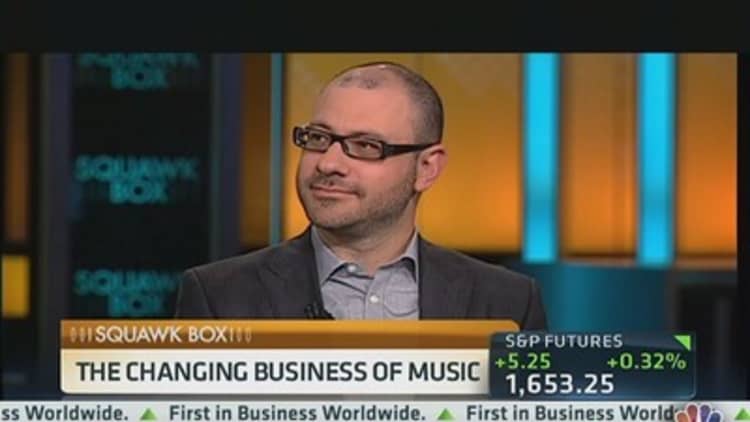The digital world has done more than change the way music is delivered to fans. It has revolutionized how labels find new acts and position existing ones.
While the days of scouts stumbling across the next big artist in a darkened bar are not completely gone, they're quickly being replaced by deep data mining. And agents and labels are increasingly leaning on social media to help guide a performer's career.
"We're seeing a bit of a revolution in terms of the music industry jumping on the bandwagon," said Liv Buli, data journalist at Next Big Sound, a specialty service that mines social media sites and digital music services for metrics to help guide labels, artists and managers. "Traditionally, it's always been reviews and sales figures that dictate every movement. More and more, people are coming on board and [realizing] you can see how fans interact with artists via social means."
(Read more: Who's profiting from your Instagram?)
Next Big Sound counts all the major labels among its customers, said Buli. The company provides a platform compiling the data from an array of social sites—including Facebook, Twitter, YouTube and SoundCloud— which lets music industry insiders learn more about up and coming artists and make smarter decisions with those in their catalog. On a daily basis, it ingests nearly 10 gigabytes of data and has accumulated over 100 billion data points to date for its clients.
The company also monitors the online popularity of musicians like Justin Bieber, who is a perennial member of the top 10, as well as compiles a list of the fastest accelerating artists across the Internet. This list, called the Next Big Sound chart, provides visibility for acts that may not be big but are seeing their growth rate exploding exponentially (indicating an amassed fan base).
That list can give labels a heads up about bands that might not be on their radar. Gotye, for example, scored a huge hit in 2011 with "Somebody That I Used to Know," but long before the song topped the charts in the U.S. and 25 other countries, it was a hit on SoundCloud, which put the Belgian-Australian singer-songwriter on Next Big Sound's watch list.
Macklemore, whose song with Ryan Lewis "Thrift Shop" conquered the Billboard charts in January, might not have been a single-name phenom until this year, but Buli said he's been on Next Big Sound's radar since January 2011. The Alabama Shakes were another group data predicted would hit it big.
(Read more: Can Twitter make bad TV good?)
"With the music industry, there's going to be that final element of human aesthetic," said Buli. "But we help narrow down what is a massive pool of artists and track down trends that show 'this is someone you should look at as opposed to someone else.'"
[Facebook] likes are cheap, and it doesn't really mean it's a real relationship.Troy CarterLady Gaga's manager and founder/CEO of AtomFactory
Embracing Little Monsters
Many artists are mining their own databases for pointers on next moves, perhaps none so efficiently as Lady Gaga. In 2008, she was one of the first musicians to embrace Twitter and interact with fans.
Her manager, Troy Carter, took that to the next level. Using data culled from her 40 million Twitter followers and 59 million Facebook 'Likes'—as well as data from ticket sales—he created Backplane, a micronetwork steering over 1 million core Gaga fans to LittleMonsters.com, where the team can cut out the middleman, improve earnings and learn more about what fans want.
(Read more: Lady Gaga, big data pioneer?)
One of the things they learned was the audience can be a part of the Lady Gaga experience. When fans began uploading artwork onto LittleMonsters.com, the pair began putting that art on T-shirts, which boosted concert merchandise sales by 30 percent.
"[Facebook] likes are cheap, and it doesn't really mean it's a real relationship," Carter said at the D: Dive Into Mobile conference earlier this year. "The way we're looking at it is how do we own that relationship?"

Hitting the right notes
Data is even being incorporated into the song writing process by some artists. Wang Bolong, lead singer of the punk band Bear Warrior and a graduate student at Beijing University of Aeronautics and Astronautics, founded SoniDigg, a musical data analysis company, to get a better sense of what was resonating with audiences.
Using a self-created device called Pogothermo, he was able to measure the intensity of an audience's dancing. Monitoring movements through sensors in the carpet, he found that fans began dancing more energetically when drums kicked in and when he sang higher notes. That feedback has been incorporated into the band's songwriting process.
"If you ask a fan what he or she thinks of the show, they only give you vague feedback like 'it was good,' but nothing specific that we could actually use to improve ourselves," Wang told The Global Times.
(Read more: )
While most artists are more likely to stick with their creative muse, rather than data mining when it comes to songwriting, big data is likely to play an increased role in the day-to-day aspects their career. Next Big Sound, for example, has found that appearing on Conan O'Brien's program has the best return on appearance, in terms of exposure and reach, of any late night show.
The data sources are likely to continue expanding, but with additional data points, tech evangelists say, labels and artists will better be able to pinpoint their next move.
"The places we were tracking when it was started are very different than what we're tracking now," said Buli. "There will continue to be an evolution in the platforms people are using, but it's going to be an integral part of managing a music career. It can be anything from running a tour and seeing where fans are, to seeing when is the best time to release an album. The data exists and it's not going anywhere."
—By Chris Morris, Special to CNBC.com




